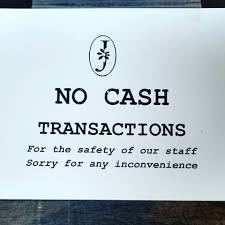Thousands of people have been prevented from paying with cash in recent months as the coronavirus pandemic further threatens the viability of Britain’s cash system, new Which? research reveals.
Nearly 2,500 people responded to the consumer champion’s cash acceptance tool, launched in mid-September, which asked people to report their payment problems. The alarming results suggest a concerning problem with cash acceptance across the UK.
Which? is calling on the financial regulator to take urgent steps to establish the full scale of the issue and ensure that cash remains a viable payment option for those who need it.
Of the reports that Which? received, four in 10 (38%) related to a problem when paying for food or groceries, one in seven (14%) were linked to leisure activities, such as going to a coffee shop or restaurant, and one in 10 (11%) were for parking.
Two in five (43%) who reported being unable to pay with cash said that they did not have another payment method at the point of purchase.
While some consumers were able to go to another shop to buy the products or services with cash instead, or had someone available to make the purchase on their behalf, one in three (32%) people said they were unable to buy the item at all as a result.
Worryingly, four in 10 (38%) left empty handed when trying to pay for groceries, while the figure stood at almost two in 10 (17%) for those attempting to purchase medicine.
Buying a product or service online was only an alternative for a small fraction of respondents, with just three percent saying they paid that way instead.
Which? also heard concerning experiences from people across a wide range of society about the impact of not being able to pay with cash, and how this results in feelings of embarrassment or frustration at the point of payment.
This includes fears of being unable to cope or losing independence if further lockdown restrictions made shopping and paying with cash more of a challenge. Some spoke of feeling embarrassed or patronised when shops refused to serve them, while others said they believed coronavirus was being used as an excuse to “get rid” of cash.
Of the people who didn’t have another payment method at the point of purchase, 62 per cent said it made them frustrated, embarrassed or anxious, 43 per cent said it was an inconvenience and 41 per cent said it had wasted their time.
While it is understandable that businesses might have concerns due to mixed messages about the safety of cash, Which? believes these findings underline how a one-size-fits-all approach of denying cash payments risks abandoning some of the most vulnerable in society, with many already struggling to access cash due to widespread bank branch and cash machine closures.
Those who may not have a bank account, or consumers who prefer to pay in cash, risk exclusion from society during the pandemic if they can’t shop or visit their local cafe. The consumer champion is asking businesses to show understanding and flexibility to those customers who might only be able to pay in cash.
Which? believes these findings could be indicative of a much larger problem that could hasten the collapse of the UK’s fragile cash infrastructure and abandon the many people who are not yet ready to make the switch to digital payment methods.
Further work is needed to understand the scale and pace of change on cash refusal, as promised legislation on cash access risks being significantly damaged if people have nowhere left to spend it.
Which? supports the government’s proposal for the Financial Conduct Authority to be given the responsibility to oversee the protection of cash access in the UK, and is calling on the regulator to also track levels of cash acceptance over time, so that it can work with the government to establish what measures may be needed to address the issue.
Consumers are encouraged to report problems paying with cash through Which?’s cash acceptance tool.
Richard Piggin, Head of External Affairs and Campaigns at Which? said:
“While many of us may have noticed shops displaying signs that they now only accept digital payments, our research shows that the rapid move towards a cashless society risks excluding the most vulnerable from being able to pay for vital products and services.
“We’re alarmed at the reports of people leaving food and medicine behind because they can’t pay with cash, and it underlines how important it is to have a coordinated approach to protecting the fragile cash system.
“The government has already proposed giving the FCA responsibility for cash. It’s vital that acceptance is also treated as a priority as part of this, as commitments to safeguarding cash access will be severely undermined if people are left with nowhere to spend it.”







